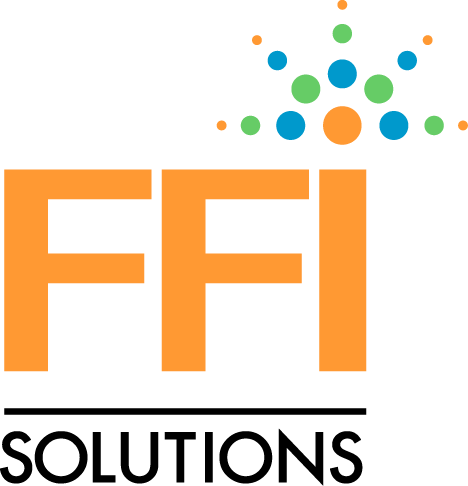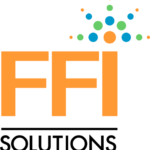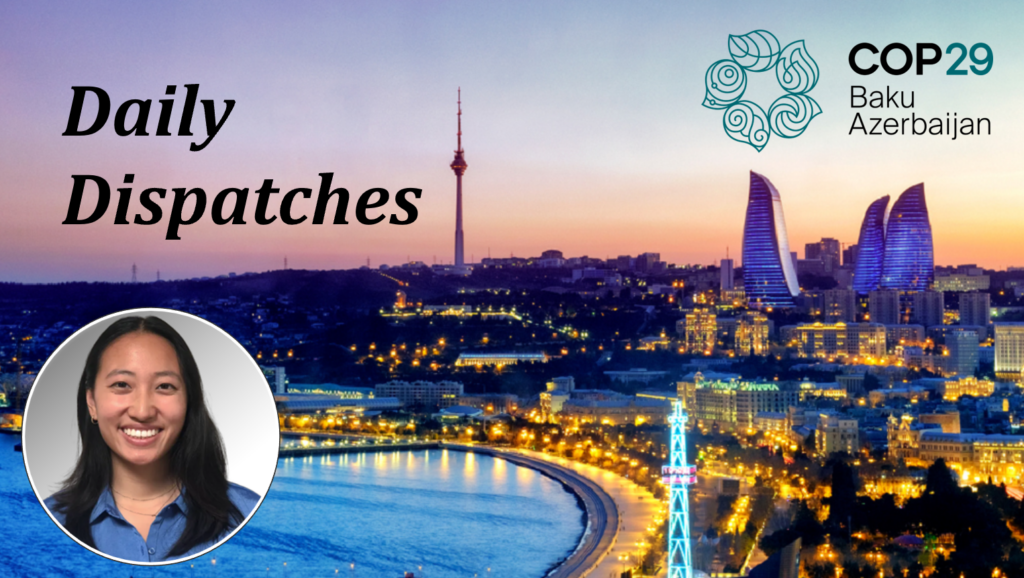
Welcome to our daily blog from COP29 in Baku, Azerbaijan, where FFI Solutions’ Sustainability Research Analyst Intern, Emily Wong, will share her thoughts and insights from the conference. Emily brings a wealth of knowledge and passion to this critical global conversation. As a student at Colby College pursuing an Economics and Environmental Policy degree, Emily combines her academic studies with hands-on industry analysis of the energy transition through FFI’s Transition Intelligence platform. Having represented Colby College at the United Nations Climate Conference in Germany, she is no stranger to the international stage and is excited to provide you with on-the-ground insights from COP29. This experience is possible thanks to the support from the Colby College Buck Lab for Climate and Environment. Stay tuned for her updates and experience COP29 through the eyes of an emerging voice in sustainability, one who represents the next generation of climate leadership.
Friday, November 22, 2024 – Diminishing Ambitions
Day 5 of COP29 offered few opportunities for observer participation. Scheduled press conferences were limited, with some even canceled, leaving much of the morning uneventful. The YOUNGO Just Transition Working Group had little to address until the delayed release of the second draft of the UAE Just Transition Work Programme (JTWP) text in the afternoon. However, the release of this text, along with drafts on other key topics, injected new energy into the conference center. Discussions became animated as participants debated the implications of the new drafts and strategized their next steps. Unfortunately, those next steps remained largely out of reach for observers, as the direction of COP29 shifted into the hands of negotiators and government ministries.
UAE Just Transition Work Programme: Shifting Priorities
Thursday Night Negotiations
Negotiations descended into disarray as countries prioritized presenting “wish lists” over refining the draft text, which was the intended goal. Rather than addressing brackets and options, some delegations attempted to introduce new elements, derailing the process. Although the Secretariat warned Parties that failing to follow the process rules (specifically, refraining from adding “wish lists”) would result in the meeting’s termination, this ultimatum was not enforced.
A key sticking point was paragraph 9, which outlines a guidance framework requiring specific obligations from the Global North. While most members of the Group of 77 (G77) developing countries supported it, opposition from Saudi Arabia and several developed nations blocked progress, leaving the text unresolved. The U.S. objected to references to youth, human rights, and environmental protections, while Saudi Arabia introduced an extensive list of demands. The session concluded with the Chairs deferring to the Presidency, which has assumed tight control over the negotiations.
Since the Chairs are responsible for drafting new texts based on the discussions, all Parties and negotiators were left waiting for the revised text to be completed on Friday afternoon.
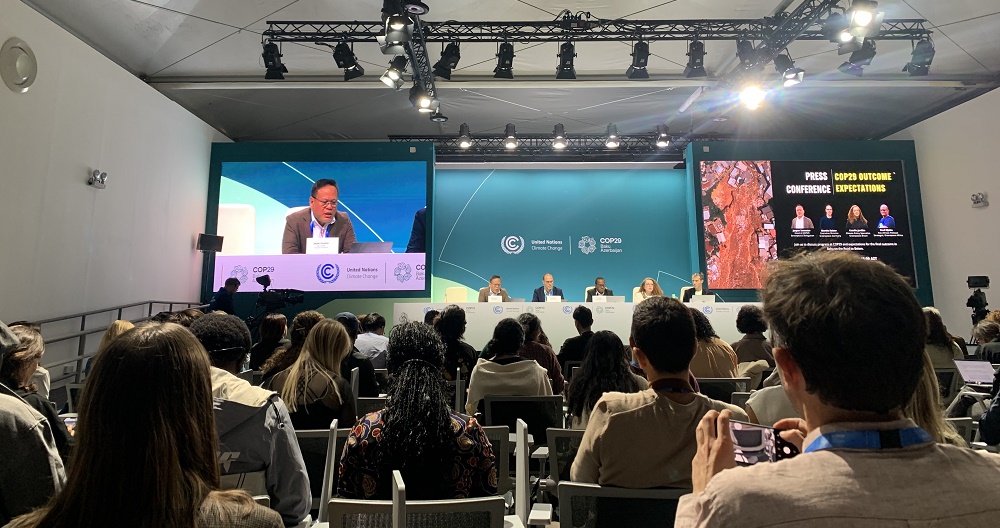
JTWP Text – Version 1 vs. Version 2
The progression from Version 1 to Version 2 of the JTWP text has raised alarm bells among stakeholders, including YOUNGO. Several key provisions from the initial draft were removed, leaving many frustrated. The language in Version 1, which called for explicit commitments to financial support for developing nations and stronger accountability measures, was either softened or omitted in Version 2.
Notably, references to the responsibilities of high-emitting nations were diminished, reducing transparency and weakening the push for equitable action. In addition, language addressing human rights, a just transition guidance framework, sustainable development, and poverty eradication was entirely removed. These omissions have heightened concerns about whether the current trajectory of COP29 can achieve the ambition and inclusivity needed to address the just transition effectively.
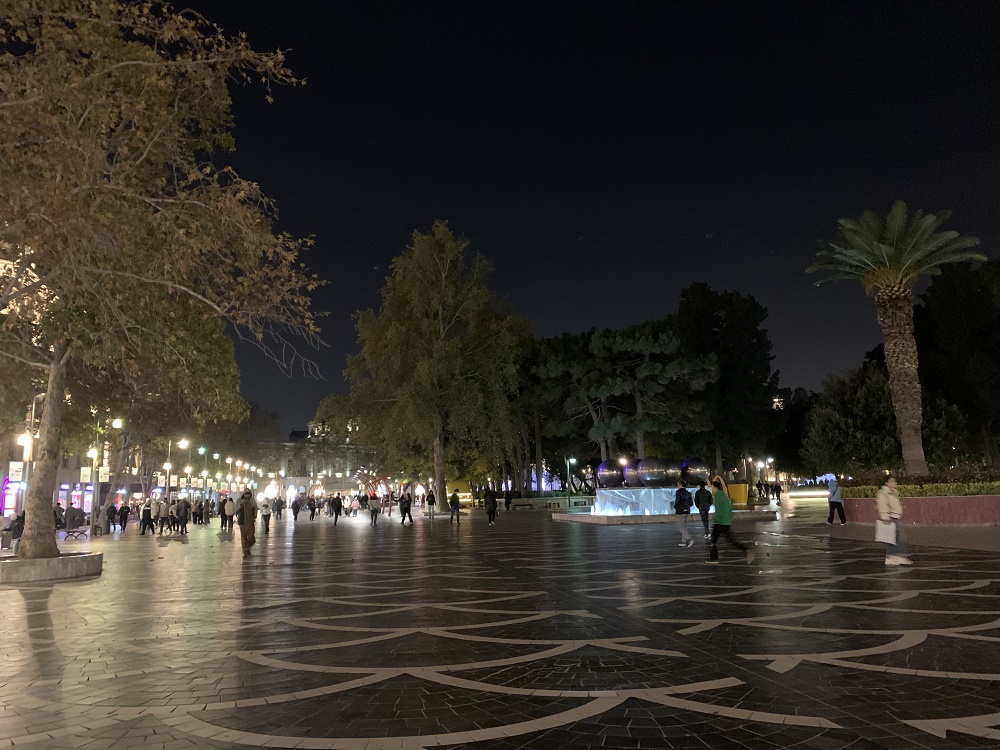
On a more positive note, Version 2’s emphasis on affordable and renewable energy highlights the need for comprehensive, economy-wide just transition strategies. These strategies aim to engage the private sector, create green jobs, expand renewable energy access, and capitalize on the socioeconomic opportunities of moving away from fossil fuels.
New Collective Quantified Goal (NCQG) on Climate Finance: Missing the Mark
The New Collective Quantified Goal (NCQG) on Climate Finance has been a key focus at COP29, but the released draft decision has fallen far short of stakeholder expectations. While experts estimate that developing nations require at least $1.3 trillion annually by 2035 from public and private sources to address climate challenges, the text set the target at a mere $250 billion per year. This is drastically inadequate, failing to align with the scale of the climate crisis and leaving developing nations grappling with a significant funding gap.
Reflection: A Critical Moment for Climate Action
As COP29 nears its conclusion, the outcomes thus far have been deeply disappointing. Observers have been sidelined, and the heavy-handed influence of the COP29 Presidency has stifled meaningful progress. The failure to secure adequate climate financing and the weakening of critical texts like the JTWP illustrate a broader failure to meet the moment.
Negotiators and ministers will continue deliberations through Saturday, but the likelihood of transformational outcomes appears slim. For now, we await the final decisions on the adoption of the (currently insufficient) texts.
Thursday, November 21, 2024 – Women and Gender
It’s Day 4, and COP29 is winding down here in Baku. Today’s sessions centered on gender and women, shedding light on the intersection of gender and finance within the broader climate agenda. The sparse attendance was a stark reminder of the lack of prioritization of gender equity in the climate dialogue. It is disappointing that, despite women comprising half of the global population, their unique challenges and contributions in addressing climate change remain underrepresented. Below are some key moments and reflections from today’s sessions.
Gender and Climate Change: Amplifying the Voices of Women
At the Gender Plenary event, the underrepresentation of women in high-level international decision-making was a recurring theme. A participant from Mexico noted that only 15% of international decision-makers are women. She stressed the importance of incorporating gender perspectives into policies at all levels, as women often serve as both human rights and environmental defenders.
Liliam Chagas, Director for Climate Ministry of Foreign Affairs Brazil emphasized the disproportionate impacts of climate change for women, shaped by intersecting identities, such as race, class, and sexual orientation. Unfortunately, intersectionality is absent in COP29 text.
Nigar Arpadarai, Azerbaijan’s Climate Change High-Level Champion, remarked, “Climate change exacerbates inequalities.” She pointed to financial barriers as a critical hurdle for women, stating, “What are barriers for women? It’s clearly finance.” Her call to action resonated with many: women must be made financially independent, as “it’s harder for a woman to go to a bank and start up her own business.”
Financing a Just Transition from a Gender Perspective
The link between finance and gender equity was further underscored in discussions about a Just Transition. A critical takeaway was that both the quantity and quality of climate finance must ensure that women on the frontlines receive adequate support. Ensuring that women are not left behind in the shift to a green economy was highlighted as non-negotiable.
Bridget Burns, Executive Director of the Women’s Environment and Development Organization (WEDO), stressed that the lack of gender-specific data hampers equitable policymaking. She argued, “Not one data point on gender can prompt policy action, but instead we need aggregated data.” She also criticized the disproportionate focus of climate research in the Global North, advocating for expanded data collection efforts in the Global South to ensure inclusive solutions.
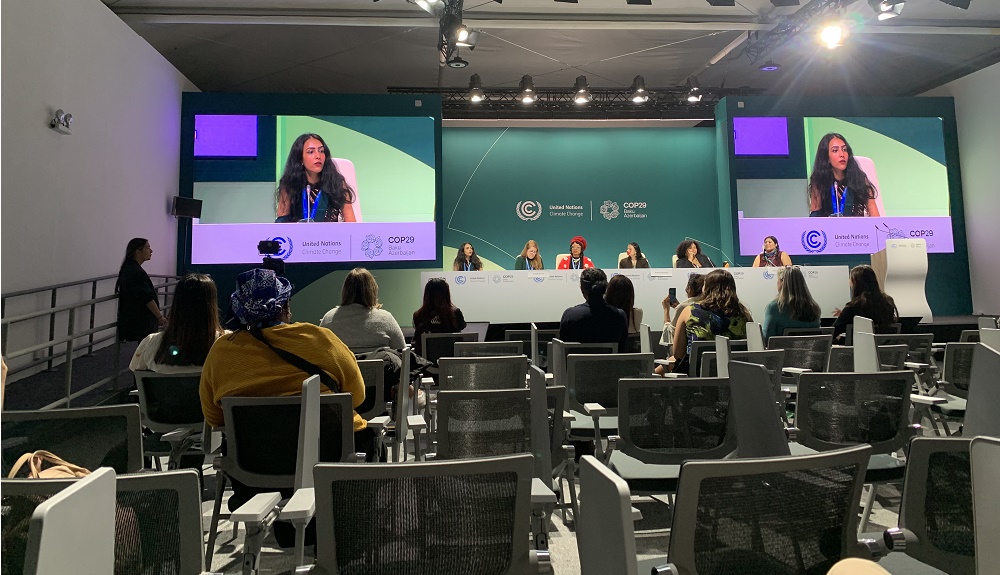
Locally-Led Adaptation: Unlocking Climate Finance for Communities
Despite growing global commitments, only 27% of climate finance reaches the local level, leaving many communities without the resources they need. Susan Chilala from Women’s Envisions Zambia highlighted the critical role of indigenous seeds in preserving soil health and the need to address systemic barriers like financing structures that limit women’s land rights.
A representative from Prakriti Resources Centre underscored the slow progress in achieving gender-just climate finance, noting that much of this funding fails to reach the Global South. Panelists called for urgent action to prioritize locally-led solutions, ensuring that those most impacted by climate change are empowered to lead the response.
Feminist Solutions to the Climate Crisis: Addressing Historical Injustices
The Women’s Earth and Climate Action Network (WECAN) session spotlighted the ongoing struggles of Indigenous women and communities. With 2,126 land defenders murdered between 2012 and 2023, WECAN drew attention to “colonial solutions to the climate crisis,” which often deepen existing inequalities. Participants called for a Just Transition that dismantles the lasting effects of colonialism, patriarchy, and capitalism.
One participant noted that, despite promises, the COP29 text still lacks meaningful commitments to women and marginalized groups. Anti-gender movements further threaten progress, underscoring the urgency of safeguarding gender-inclusive climate language.
Climate Education as a Climate Solution
The role of education in advancing climate solutions took center stage during a session featuring a Costa Rican student who shared her firsthand experiences of climate impacts in a rural coastal community. Issues like flooding and disrupted access to education underscored the urgent need for community-based climate education programs.
Renata Moraes from The Climate Reality Brazil highlighted indigenous knowledge as a vital tool for addressing the climate crisis but observed that “money always finds the interest of society.” The session also emphasized that financial barriers significantly hinder efforts to develop a green curriculum that prepares young people with the skills needed for sustainable entrepreneurship.
Renewable Energy
Key actionable insights emerged from discussions on accelerating renewable energy deployment and addressing methane emissions. Ilina Stefanova of the International Renewable Energy Agency (IRENA) noted, “Renewable energy is the fastest, cheapest way for the economy to grow,” while emphasizing that “NDC pledges are nice, but they need to be implemented.”
On the manufacturing front, participants lamented that “manufacturers don’t have enough buyers for green steel, cement, and hydrogen.” They stressed the need for coordinated action between governments and the private sector to create demand and de-risk green investments.
Reflections
While I am pleased that the COP29 Presidency included gender on the agenda, it is evident that the topic is not a priority for many countries. Today’s discussions highlighted the interconnectedness between gender, finance, and climate justice, underscoring the urgent need for transformative action. We must focus on ensuring women’s inclusion in international climate decision-making, advancing local-level climate financing and solutions, promoting gender-just climate financing, conducting research on gender inequities in the Global South, and increasing investments in renewable energy.
Tomorrow is the last official day… will negotiators have finalized their decisions?
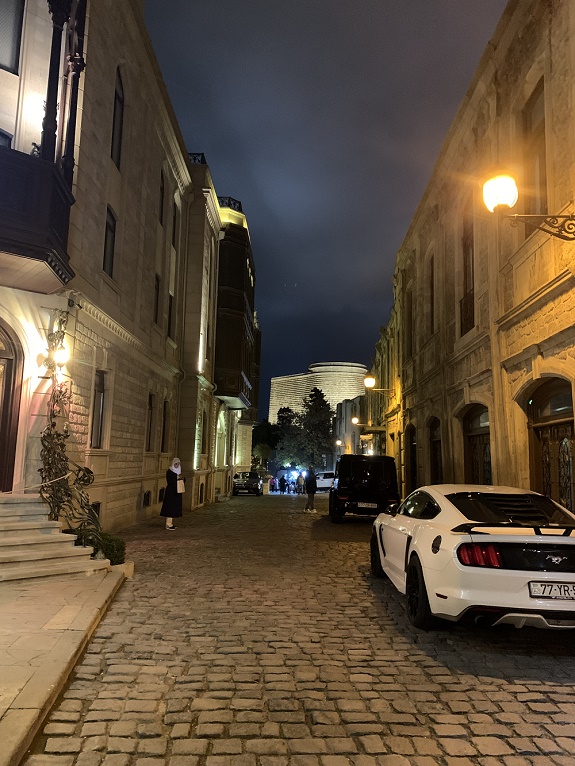
Wednesday, November 20, 2024 – Green Zone Insights
As we’re sharing badges, Day 3 at COP29 was my opportunity to explore outside the main event. I spent the day immersed in the Green Zone – a vibrant space hosting non-country pavilions and organizations dedicated to climate action.
How Do You Feel About Climate Change?
For me, the Global Alliance of Universities on Climate (GUAC) stood out, offering a platform to engage with young leaders from around the world. I was drawn to two compelling discussions. The first explored the intersection of mental health and climate change. The speaker highlighted the emotional toll faced by communities grappling with climate-induced disasters, with stories shared from Japan, Pakistan, and the Philippines. These narratives were a reminder that climate change not only has environmental and economic costs, but also that human costs are a significant driver of climate action.
After the talk, I engaged with students affiliated with the GUAC and connected with a local Azerbaijani volunteer working at COP29. This conversation shed light on Azerbaijan’s struggle to meet its carbon reduction targets – a challenge that many nations face. I believe the location of COP has a huge influence in the trajectory of progress.
Negotiation Highlights
The second discussion provided an overview of key negotiations at COP29, focusing on the New Collective Quantified Goal (NCQG), Article 6 of the Paris Agreement, and procedural challenges.
- NCQG
Discussions on the NCQG for climate finance have been marked by limited transparency, with meetings now closed to observers and party overflow. A nine-page draft from Week 1 has grown to 25 pages, reflecting added complexity. Two key approaches are under debate: a single-layer structure dividing provisional goals and mobilization, or a multi-layer structure. While some view the latter as balancing Global North and Global South interests, inclusion of new elements has made it complicated. COP29 week 2 is hinting that a consensus on the NCQG remains unlikely.
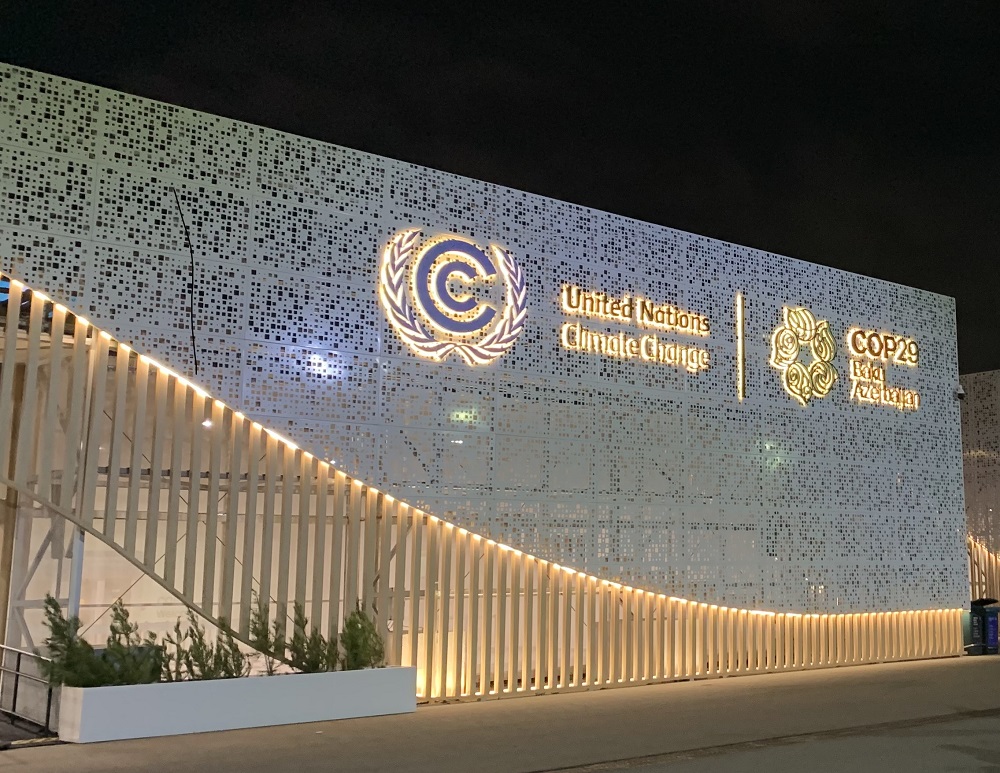
- Article 6: Behind Closed Doors
Discussions on Article 6 of the Paris Agreement enable voluntary cooperation on achieving emission reduction targets in their Nationally Determined Contributions (NDCs). Compared to last week, this week has been hindered by a lack of transparency with negotiations taking place behind closed doors without informal consultations from other stakeholders.
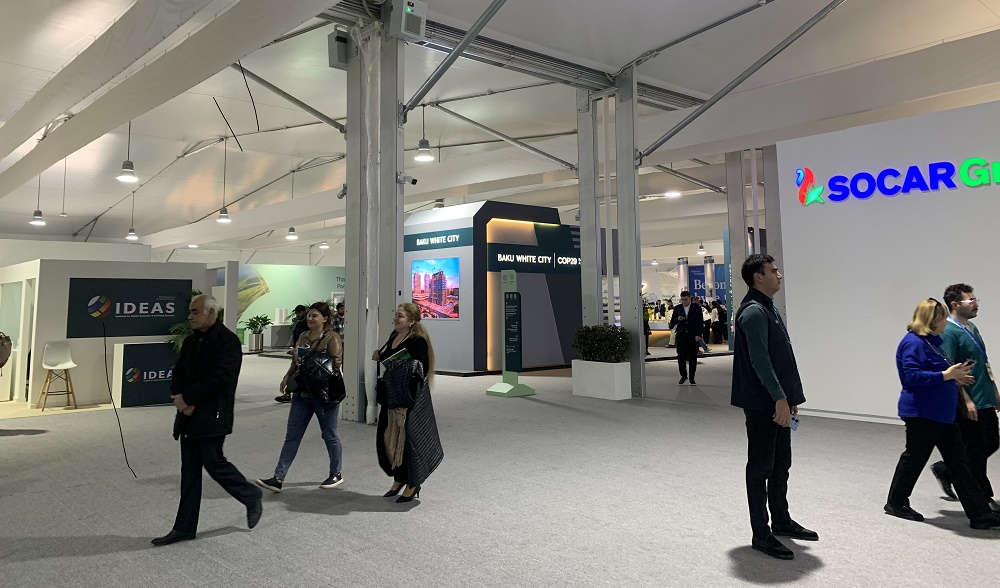
- Broader Challenges
Lack of transparency and delayed submissions have undermined momentum. With a rushed week 2 agenda, consensus on the NCQG for climate finance seems unlikely, as tensions between Global North and Global South priorities remain unresolved. These highlights reveal incremental progress but also significant structural and procedural hurdles, raising concerns about COP29’s ability to deliver on its ambitions.
Reflections
While stakeholders are now permitted to email submissions and contribute to interventions, there is often no time to do so. It does not appear that negotiators are putting much consideration into emailed submissions. Moreover, with meetings now closed to observers, progress is even more challenging. It’s essential for stakeholder engagement to be improved and sped up for any substantial movement.
Tuesday, November 19, 2024 – Shifting Priorities
Day 2 has been a whirlwind of discussions, challenges, and opportunities. It’s clear that COP29 is grappling with a mix of ambition and hesitation. Much of the focus has shifted to the New Collective Quantified Goal on Climate Finance (NCQG) and the Global Stocktake (GST), sidelining many other critical topics including Just Transition, Agriculture & Food, Loss and Damage, Oceans, Gender and Women, and Health.
With three days remaining, I’m already hearing conversations on COP30 in Brazil. Many here seem to believe that this year’s summit won’t deliver groundbreaking outcomes, and that more substantive progress will have to wait.
Just Transition: A Missed Opportunity?
Most of the discussions on Just Transition are taking place behind closed doors, leaving observers like YOUNGO – including my small but dedicated Working Group – without a voice. It’s disappointing to see the topic winding down with little progress, but we remain hopeful for stronger commitments at COP30.
Diverse Topics: Glimmers of Progress
Moving between meetings focusing on a range of topics:
- Global Stocktake (GST): The GST meeting focused on the Intergovernmental Panel on Climate Change (IPCC). The session was a bit dry, as negotiators covered tedious grammatical concerns on phrases and sentence structure. Overall, it felt like an anxious atmosphere with the co-facilitator reiterating that “time is of the essence”.
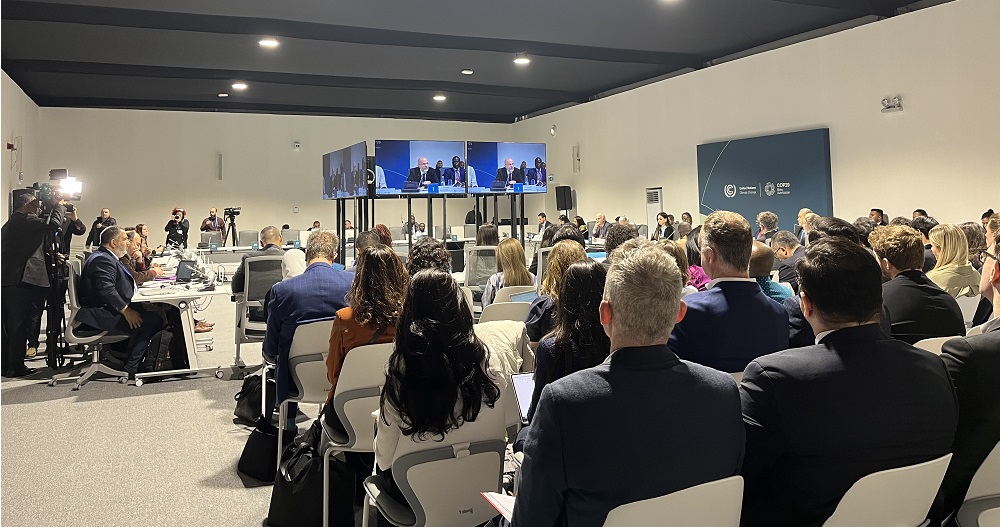
- National Adaptation Plans (NAP): At the NAP meeting, the speaker table was relatively empty with only 30 or so country department representatives attending rather than party negotiators. Most discussed their country’s specific climate disasters, such as Honduras who is enduring a fifth day of catastrophic tropical storms. The urgency for adaptation finance was clear, as many emphasized the need for mechanisms to implement plans effectively.
- One Health: The long que to enter the One Health meeting signaled its importance. One Health focuses on the interconnectedness of humans, animals, the environment, and health. The topic of health was first introduced at COP28, and the COP29 presidency pushed for One Health to be on the agenda. With nine high profile speakers and a strong media presence, discussions on health issue concerns covered animal-borne diseases infecting humans (new and re-emerging) exasperated by pesticides, use of antibiotics, and anti-microbial issues. Proposals to lower disease risk included restoring ecosystems – offering carbon, health, and financial benefits – with that savings reinvested into other climate change matters, improvement of medical facility infrastructure, and strengthening the health workforce.
- Critical Minerals for the Energy Transition: Demonstrating the growing interest and importance of critical minerals, I was unable to join this full session, which was at capacity.
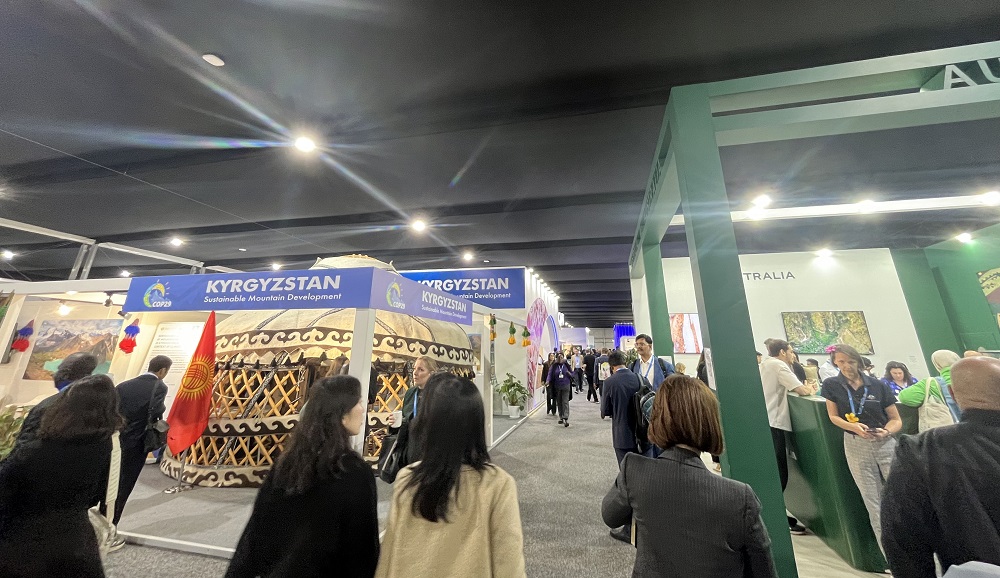
Reflections
Flanked by official COP29 “In Solidarity for a Green World” banners, I also took some time to explore the maze of country pavilions, listening to host talks. I was taken by the extravagance of some and noted that the OPEC pavilion was empty.
For those of us deeply invested in the outcomes of COP29, this week has been a reminder of both the possibilities and the challenges of global climate action. The NCQG and GST discussions signal opportunities for significant financial reform, but the lack of momentum on issues like Just Transition leaves me concerned. With the remaining days of COP29, I look forward to tracking the environmental, social, and financial implications of these negotiations. There’s still hope for meaningful progress, but it’s clear that much of the heavy lifting will need to happen at COP30.
Monday, November 18, 2024 – Just Transition
Today, as COP29 enters its second week, the focus on achieving a Just Transition—ensuring no one is left behind in the energy transition—took center stage in discussions and events across the Baku Conference Center. On a happy start, the city’s efficient shuttle services for COP29 attendees have minimized traffic disruptions.
My day began covering a meeting of YOUNGO, the UNFCCC’s youth constituency, followed by discussions with their Just Transition Working Group (JTWG). The Group’s efforts align with the United Nations’ principle of ensuring that “no one is left behind or pushed behind in the transition to low-carbon and environmentally sustainable economies and societies” (United Nations Committee for Development Policy). I (and the Just Transition Working Group of YOUNGO) had informal meetings with a few country delegates. During these chats, we explored actionable outcomes and attempted to gain insights into ongoing negotiations that are happening behind closed doors. The outcome of our discussions emphasized the need to integrate Just Transition into existing financial mechanisms, like Loss and Damage and Adaptation funds.
My day concluded with the Second Annual High-Level Ministerial Roundtable on Just Transition. Discussions highlighted the importance of tailoring Just Transition strategies to national contexts, ensuring inclusivity through multi-stakeholder dialogue, and addressing workforce needs through up-skilling and re-skilling initiatives. They also emphasized the fiscal constraints, limited technological development and technology transfer, and insufficient capacity building faced by developing countries.
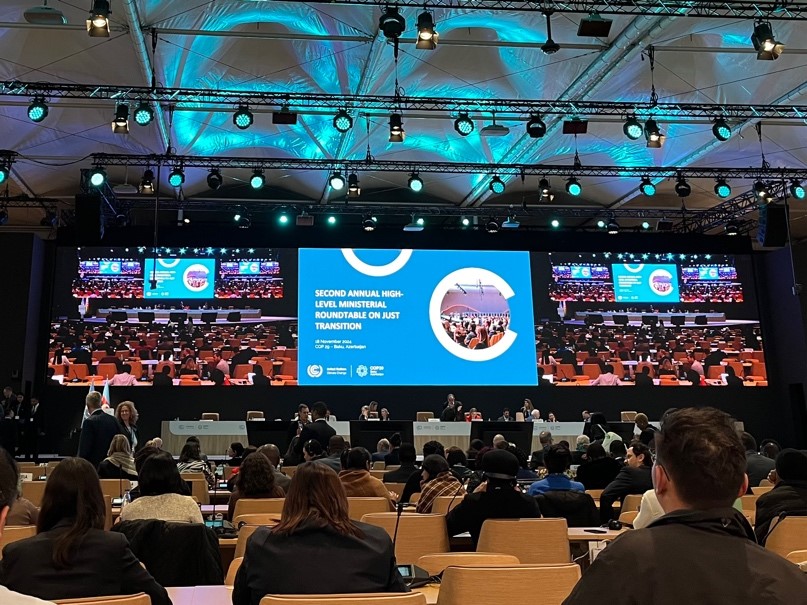
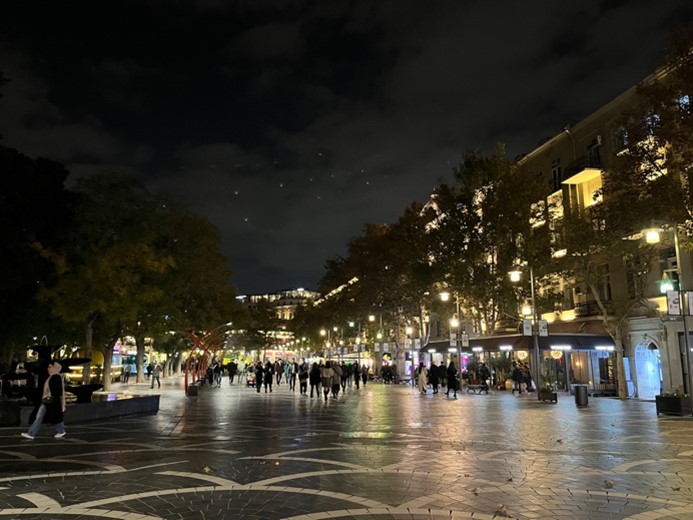
However, diverging national approaches – such as the U.S. focus on domestic funding – drew criticism for sidelining global responsibilities even as several parties highlighted the importance of Common but Differentiated Responsibilities and Respective Capabilities (CBDR+RC). Participation in this meeting was robust, with many parties and organizations eager to speak. Unfortunately, after more than three hours of discussion, many were left without the chance to speak and instead were asked to email written statements to the Secretariat. Ironically, despite repeated calls from delegates for more inclusive stakeholder engagement, the session concluded with frustration for YOUNGO and other organizations. Nevertheless, there was consensus that the work program must deliver actionable outcomes for Just Transition goals.
As the day concludes, I reflect on the vibrant energy of Baku’s city center—a blend of tradition and modernity mirroring the contrasts and aspirations of the discussions here at COP29.
Until tomorrow… Emily Wong

Emily Wong
Sustainability Research Analyst Intern
FFI Solutions
